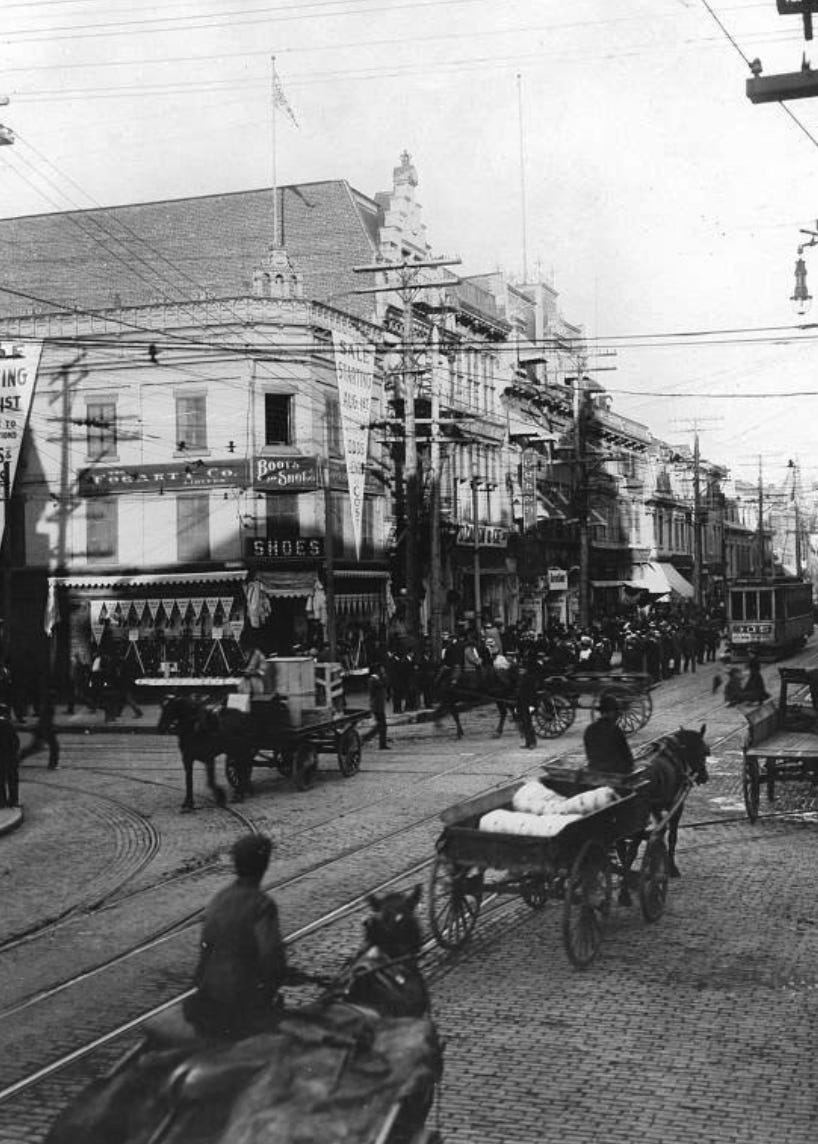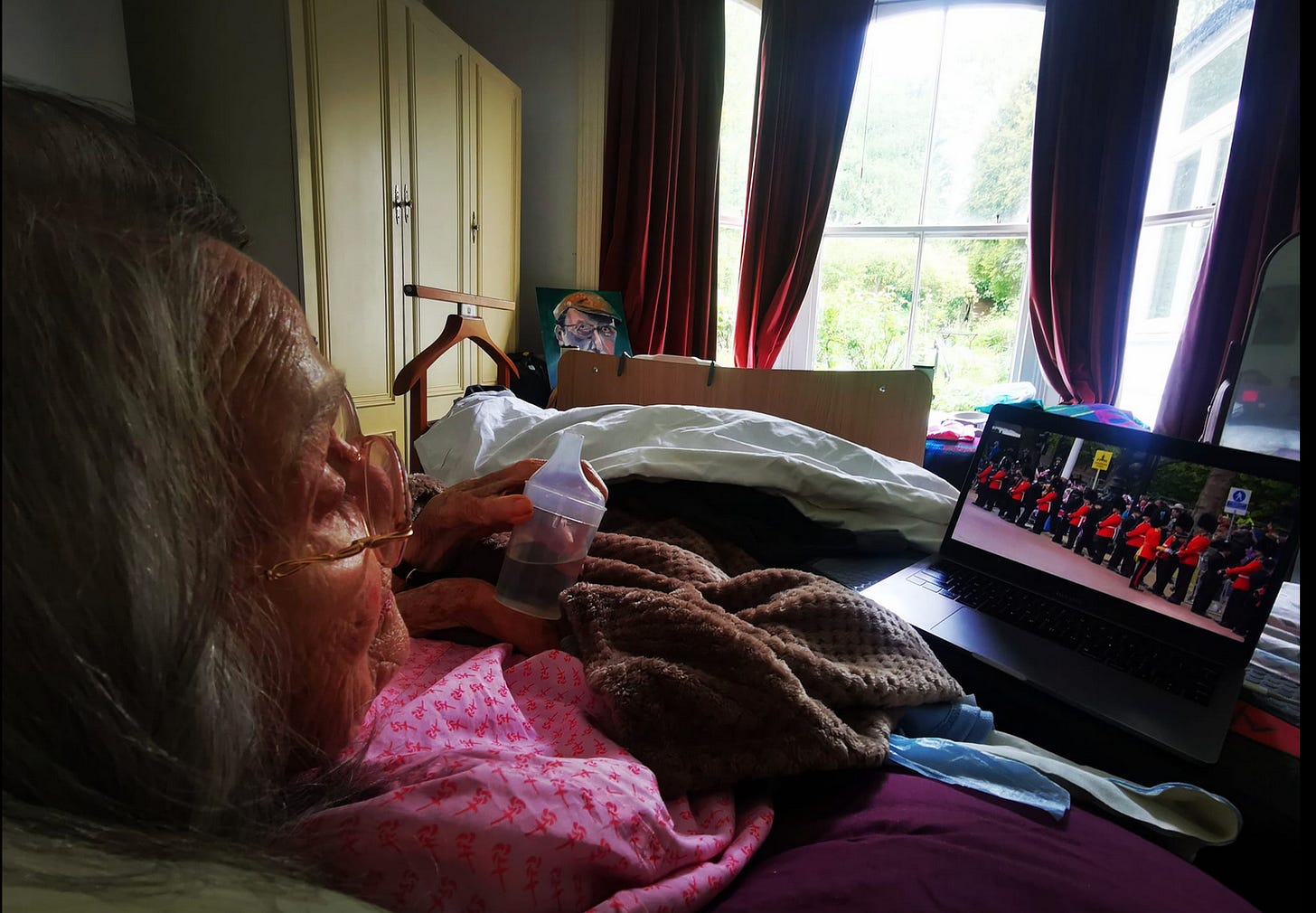I have already written about the Main Deli in collaboration with Dominic, Peter’s son. I didn’t think I’d revisit my favourite Montreal jaunt so soon or with such sadness.
Two weeks ago I was approached by a Canadian writer, who asked me to write what I felt about smoked meat, as they had watched Birth of the Smoked Meat our documentary with the idea to put together an article in the future, perhaps. Then, as people often do, I never heard from them again. So, I will publish what they asked me, prophetically, on the 17th May 2023 later. Right now, I go back in time.
"Don't wait. Do it now. The right moment will never come.”
This is what Stanley Lewis said to me when I sat in his dusty studio on the Main. It was 2005. I was in my second year of film production at Concordia University and I needed to find a new subject. “Smoked Meat! Make a documentary on smoked meat and the Main Deli.” He insisted.
“Oh God Stan!”
We did.
Thanks to that Oh God and Stan!
The Main has now GONE - last week it shut its doors after 50 years!
But we have the memory on film. Real film, 16mm, cut, sliced and patched on the Steenbeck in the Concordia editing rooms. Creating the animation, stop-motion, working with Stan on the idea. Late nights with Zoe, drunk on coffee, drunk on love of film. Drunk love.
I still enjoy watching Birth of the Smoked Meat, remembering with love the people, time and place that we captured.
Yes, it was a time and a place, it was history, and now it is history, the place I fell into when I first arrived in Montreal, a time which was so special, the time of the last of the beatniks - Ryan Larkin, Stanley Lewis, Leonard Cohen - slowly walking from the streets once paved in gold...
It was a time and a place, it was history

Stan of the Main, Saint-Laurent Boulevard.
Stan also of the Main Deli made his home between Bagg and Napoleon Street, this segment running a few shops on the Boulevard, made famous by Mordecai Richler in The Apprenticeship of Duddy Kravitz:
On each corner a cigar store, a grocery, and a fruit man. Outside staircases everywhere. Winding ones, wooden ones, rusty and risky ones. Here a prized lot of grass splendidly barbered, there a spitefully weedy patch. An endless repetition of precious peeling balconies and waste lots making the occasional gap here and there.
Leonard Cohen, hung out on the Main, living just up the road on Marianne Street. He loved the Main Deli and would "watch the gangsters, pimps, and wrestlers dance around the night" (David Sax - journalist.)
Albert Kish, documentary filmmaker, made a gentle film which captures the soul of Montreal's St. Laurent Boulevard in the '70s. “The street, also known as The Main, is a little Europe with many languages, foods and small courtesies that make a stranger feel at home.” (ONF).
Watch his wonderful film here - Our Street was Paved in Gold.
And now …
Stan gone
Leonard gone
Mordecai gone
The Main Deli gone
I phone Ivan, my brother. He always helps put complex things into perspective when my mind is muddled. I cry down the phone to him, stuck in that limbo of was and when, all emotions clanging together.
I send him the article from the papers.

Ivan Pope
On work as a time machine
When we experience events in our life and when we make work based on that experience we don't understand that we are creating a time machine. Even a memory is a time machine, but a personal one, which is why we create art, to share that time. In the moment there is no future and no past, just what is. Later, when we look back at meaningful events, we can get mournful, knowing that we cannot return to those times, to those people, to those experiences. We cannot be ourselves at that time with all the potential we felt we had. But this is to misread our situation and to miss an opportunity. What we did at that time was to create a time machine. Writing a book or making a film allows travel in time. When we read a novel written in the last century or earlier, we are travelling in time. Those artists created time machines which exist for our use. And so it is with our own work, what you made, what you gave to the world, is a machine for revisiting a moment.
What is a time machine but that?
Thank you Ivan.
Thank you Stan.
Thank you Zoe and Glauco and Concordia Film School.
Thank you Peter and everyone in the Main Deli.
Thank you Dominic for always being so generous with your time and for my many questions about your father, Peter.
The Main Stay
is gone…
Montrealers mourn.
Revised Questions from AW to me last month.
Why did you make a documentary about Montreal smoked meat?
I was at Concordia’s film school in my second year and inseparable from Stan; he was my mentor of sorts. He had this thing about documenting the area between Bagg Street and Napoleon Street on the Main and filming the smoked meat process. He said I simply had to make this documentary and it had to be on the Main Deli and the owner, Peter Varvaro - nowhere else, and on no one else.
I suggested it in class and everyone laughed except my teacher, Mariella Nitoslawska and a very young student Zoe Mapp. Zoe asked if she could work with me. I jumped at the chance as I loved her work. That’s how it happened. We also had the very talented Glauco Bermudez working with us as our cinematographer who filmed in 16mm.
What is the process ?
Peter of the Main Deli hand-selected the meat and he “definitely had an eye for the right cut. The requirement was always the same: steer brisket - between 10 and 15 pounds each - the bigger the better, trimmed clean of fat except for the fat cap on the fatty end of the brisket.” (Dominic Varvaro) @thesauceison
The meat arrived once a week and was taken to the kitchen where it was immersed in huge trays of spices and garlic. The spicing is so important and Peter created his own Main Deli brand which is sold, but we will never know all the ingredients. “The main ingredient in the rub and the brining process is salt. The spices would arrive in 40-gallon cardboard drums. The meat was well-rubbed with spices and then placed into huge barrels. No liquid was added - the salt leached out the water from the briskets creating its own brine.” (DV) The briskets are wedged in as you would cucumbers for pickling. There are also special spices and herbs in the brine. These are then pulled into a cold larder for up to two weeks. When ready, it is taken out by the head smoker and hooked into the smoking oven. Once the oven is loaded, the smoker cooks at very low heat for hours. I remember Linford the smoker doing the smoking in the morning, and it would be ready in the late afternoon. The smell is the most delicious ever. The meat is then placed into a large steamer in the front of the Deli, ready to carve and eat.
So, in all, it is roughly a two-week process.
What surprised you? What was unexpected?
The thing that touched me the most and was very unexpected was the experience of filming Peter Varvaro with his workers and their genuine dedication to him and their work, and his dedication to them. Also, the fact that not one of them would give away the secret of which spices were used to marinate the meat; this gave an epic quality to the experience.
Dominic, Peter’s son, reminded me of a very important fact. "What made the smoked meat great was the old-school end-to-end process that he used – hand-rubbed versus machine processed, naturally brined versus pumped full of nitrites, wood smoked versus chemically flavoured, and then knife cut versus the meat slicer. There were a lot of shortcuts he could have taken to make the sandwich more profitable to him. "(DV) I honestly felt that each time a batch of meat was taken from marinating and placed into the oven to smoke it was a piece of art. It was treated as such by Linford, the head smoker.
Secondly, most of his workers had been with Peter for years. Barbie is Polish; the Main Deli was her first job ever in Canada. She had been there for twenty-five years at the time of filming. She was proud of her job, her work ethic, and made the “best coleslaw in the whole of Montreal!" Maryse owes her life as a waitress to Peter - she says this in our documentary - and she is still working there today. This longevity of the workers' lives in the Main Deli reflected the love that was poured into the food. Leonard Cohen was a regular among many local celebrities. It was also such a family-orientated eatery.
Thirdly, Peter operated out of the generosity of the soul. He hired Salmin from Pakistan, who did not have his papers. Peter supported his request for residence diligently, which he finally got after ten years. It showed up in the filming that his people were important, and because of this it flowed back into the food and the service.
Instant Karma.
So, all in all, Peter is synonymous with community and caring through food.
Through making a documentary on smoked meat has it changed your experience of eating it?
I was adopted by an Ashkenazi Jewish father in London, England, as a baby, so in many ways I felt I was coming home when making this film. As much as for Stanley and Peter, this film was for Marius my father. When I tasted Montreal smoked meat for the first time in 2000 I loved it; however, making our documentary, learning the process and the deeper history, has left a touching emotion for me. I imagine the way it would have been brought over on the boats, perhaps smoked and dried in the very village of Seda, Lithuania, where my father's forefathers came from. Also, a process that takes this long can only bring about culinary magic.
Jeanne Pope - 17/04/2023
I found this card today in my box of cards from Montreal. Yes, Peter, you were the Main Man!
Never forgotten.
To finish
Thank you to everyone who sent me such kind words after the last Substack. Do not go gently into that good night.
Mum came home as promised. (Read the last Substack here)
We worked it out. Found the guts to do it. Knowing it was not going to be easy, a challenge, a soulful and mournful challenge.
She came back 10 days ago and the entire family has moved into her room, plus the cat!
Her final journey. Carrying her bag of medications she came in as if she had never left, mumbling about the dust, and the overgrown garden, then saw the local cheeky fox sneaking through the undergrowth and settled back into her world.
Her room.
Now time is fragile and I am grateful for this time.
THANK YOU FOR READING AND SUPPORTING MY WORK
It means a lot to me.
If you are interested in Documentary Storytelling and Digital Storytelling, visit my website for info www.scatterflix.com.
Coming soon.
Have a wonderful rest of May
Madness
And create your own time machines….
JEANNE, with love












The idea that memories are time machines--so profound!
Thank you, Jeanne , for this touching account of special times ( and special people) ,in times gone by.
Saralee ( Lee) Lewis, Wolfville, Nova Scotia